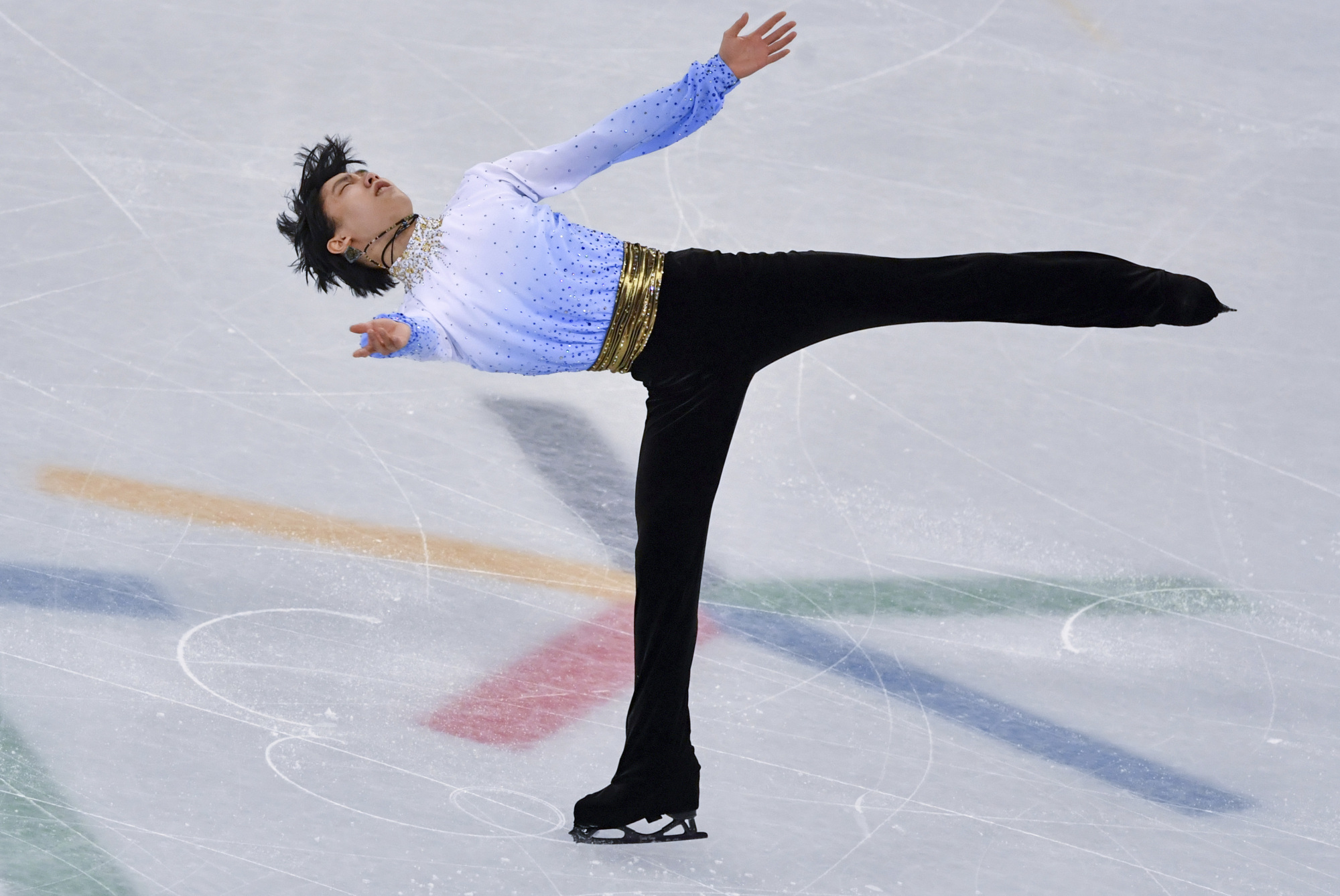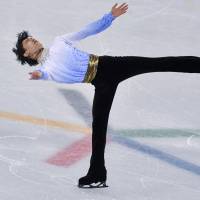With the epic Olympic season now concluded, Ice Time has come up with a top 10 list of the best performances by Japanese skaters.
The list places a priority on results in major competitions like the Pyeongchang Olympics and world championships, while taking into account mitigating factors like injury, record scores and big moves up the standings.
1. Yuzuru Hanyu — Pyeongchang Olympics (Short Program)
This was unquestionably the best performance of the season for any skater. With all of the drama and doubt surrounding the defending Olympic and world champion after his ankle injury at the NHK Trophy three months earlier, Hanyu came through with a fantastic effort that was mind-blowing.
"Hanyu went through one element after another with the style and panache we have come to expect from the skating giant, earning massive roars from the crowd as he ticked off each one," Ice Time wrote.
"The 23-year-old put on a majestic show for the ages. It was a superb exhibition of technique and showmanship that left many in attendance in awe of Hanyu's combination of power, grace and artistic prowess."
I have seen some incredible feats in all of my years as a sportswriter, but this is at the very top of the list. Keep in mind that Hanyu had not even done a full run-through of his short program to Chopin's Ballade No. 1 in Pyeongchang until that Friday morning. Hanyu's score of 111.68 points was the second-highest ever recorded.
2. Yuzuru Hanyu — Pyeongchang Olympics (Free Skate)
Though not as technically sound as his brilliant free skate at the 2017 worlds to "Hope and Legacy," Hanyu's free skate to "Seimei" was a defining moment.
Would Yuzu be remembered as a guy who won the Olympics once or join legends Gillis Grafstrom, Karl Schaefer and Dick Button as the only men to take the gold twice in a row?
With very real questions about his stamina after being sidelined for more than two months after his injury, Hanyu came through in resounding fashion, becoming the first man in 66 years to defend the Olympic title.
"Against what seemed almost insurmountable odds after suffering a serious injury to the lateral tendon in his right ankle just three months ago that kept him off the ice for two months, the Sendai native landed four quadruple jumps to scale the summit of the sport in spectacular fashion at Gangneung Ice Arena," Ice Time wrote. "What he did here was nothing short of phenomenal."
3. Yuzuru Hanyu — Autumn Classic International (Short Program)
Hanyu began his season at this Challenger Series event in Montreal. Returning to the Chopin's Ballade No. 1 selection that he had used in two other seasons, the Sendai native broke his own world record with a tally of 112.72.
In control from start to finish, Hanyu launched his Olympic season with a commanding performance in front of a huge number of Japanese fans who had traveled to Canada to watch him compete.
4. Shoma Uno — Pyeongchang Olympics (Short Program)
Uno came close to his personal best with a mark of 104.17, putting him in third place behind Hanyu and Javier Fernandez going into the free skate. The 19-year-old landed two quads and received level-fours for his spins to "Winter" while putting himself firmly in medal contention.
Skating in his first Olympics, the Nagoya native showed no signs of being affected by the pressure or glare of the spotlight. The following day Uno overtook Fernandez to claim the silver medal behind Hanyu.
Uno's comments after the short program were classic Shoma.
"For this competition, I have been practicing as usual, so I did not do anything too different to prepare," Uno stated. "I didn't do anything special just because it was the Olympics. My practices here have been shaky, but that's pretty much the usual for me."
5. Wakaba Higuchi — Free Skate (World Championships)
Higuchi's performance to "Skyfall" is top 5 material for a couple of reasons.
After struggling in three straight major events (Japan nationals, Grand Prix Final, 2017 worlds), it was very apparent that if she was unable to come through under pressure again, her career could fall into an irreversible decline.
Second was the fact that Japan's three spots for next year's world were riding on Higuchi making the top 10 in Milan, Italy.
Eighth after the short program, the stage was set for a dramatic rise or fall. The 17-year-old dug deep with a courageous showing that included seven clean triple jumps and vaulted her all the way to the silver medal.
6. Satoko Miyahara — Pyeongchang Olympics (Free Skate)
Starting the season late after recovering from a serious hip injury, Miyahara came back to win Skate America and take her fourth consecutive national title.
Things were lining up nicely for the Kyoto native before a stumble at the Four Continents in Taipei, where she came in third behind compatriots Kaori Sakamoto and Mai Mihara. The stoic Miyahara then shocked observers there by breaking down at the post-event press conference in frustration.
Miyahara's fine short program saw her in fourth place in Pyeongchang going into the free skate, behind Alina Zagitova, Evgenia Medvedeva and Kaetlyn Osmond. With a strong showing to "Madame Butterfly," an Olympic medal was within Miyahara's grasp.
"The four-time national champion did everything she could to try and grab the bronze, skating brilliantly from beginning to end," Ice Time wrote. "She landed seven triple jumps and earned level-fours on her spins and step sequence while posting a season's best in the free skate (146.44), but it just wasn't meant to be."
"Being here is glorious enough and I'm very happy, whatever the result," the always-classy Miyahara stated. "Standing on the Olympic ice, I wanted to devote every effort to what I've worked toward for four years."
7. Kaori Sakamoto — Four Continents Championships (Free Skate)
Coming off second-place finishes at Skate America and the Japan nationals (both behind Miyahara), it was evident that Sakamoto was surging, and it all came together for her in Taiwan. Second after the short program, the 17-year-old (who turned 18 on Monday) took home the gold with her scintillating free skate to "Amelie."
The Kobe native exhibited her great jumping ability and considerable fortitude by hitting seven clean triples to lead a Japanese sweep of the medals. This victory brought her deserved attention ahead of the Pyeongchang Games.
8. Kazuki Tomono — World Championships (Free Skate)
Pretty much unheralded in the huge shadows of Hanyu and Uno, Tomono came up with the skate of his life to "West Side Story" to help secure the three spots for Japan's men at next year's worlds. With Uno injured earlier in the week and Tomono 11th after the short program, the outlook was grim.
Tomono, Japan's 2016 junior champion, rose to the occasion with the finest effort of his career. The 19-year-old from Osaka landed two quads and seven triples to finish third in the free skate with a personal best of 173.50 and move all the way up to fifth in the final standings.
It was quite a show at his first senior worlds and could not have been more timely for his country.
9. Mako Yamashita — World Junior Championships (Free Skate)
With four medals in her four Junior Grand Prix assignments over two seasons, Yamashita's consistency has become a hallmark of her career. She was second at the Japan Junior Championships in Maebashi, Gunma Prefecture, in November and is seemingly always on the podium.
Her first world juniors in Sofia was no different, as the 15-year-old from Nagoya added to her medal collection by taking the bronze with her free skate to "Madame Butterfly." Third after the short program, the steady Yamashita landed seven clean triples and earned level-fours for her spins and step sequence, beating out teammate Rika Kihira to make the podium.
10. Rika Kihira — Japan Junior Championships (Free Skate)
Kihira went into the Japan juniors as the overwhelming favorite due to her ability to execute the triple axel. She stumbled in the short program and found herself in sixth place going into the free skate.
The 15-year-old from Nishinomiya, Hyogo Prefecture, put it all together in her skate to "La Strada," landing two huge triple axels in the opening minute and added five more triples to overtake Yamashita for the title.
Kihira would also hit two triple axels in her free skate at the Japan nationals (where she finished third behind Miyahara and Sakamoto), but here she rallied to the title and that is why it makes the top 10 list.
Quads in question
During a recent interview with Russia's TASS news agency, ISU vice president Alexander Lakernik was asked if the number of falls during the men's event was related to the quads they tried.
"During the ISU congress in June, we will discuss an offer for limiting the number of each type of quad jump to one per program instead of two which we have right now," Lakernik responded.
I wanted to know what a coach, who requested anonymity, thought of this proposal.
"Will science limit the athletes going as high and fast with as many rotations as possible or will people limit it?" the coach wondered. "It appears that people are trying to limit it and I don't know exactly why.
"When the quad first came in, the feeling was that only a few people would be able to do it. Now you have all 24 men at the worlds doing it."
The coach sees limiting quads as just a stop-gap measure.
"I'm not a real proponent of that, but yet I understand what the process is," the coach said. "So if you do one lutz, one flip, one loop, one salchow, one toe loop, that's good. But that's going to even the field, then what? The men will all do that, then how do you tell the difference?"
The coach doesn't favor legislating against athleticism.
"At some point in athletics, in the physicality of the sport, there has to be a difference-maker, and if they limit that then right now it would be fine," the coach pointed out. "Then in the next couple of years people would struggle to get the quad lutz and quad flip, then the field of play will even itself out.
"Then they will have to do something different to distinguish between the top and the rest. It won't be a big deal right now, but in 4-5 years they will all be doing the same thing."


















With your current subscription plan you can comment on stories. However, before writing your first comment, please create a display name in the Profile section of your subscriber account page.